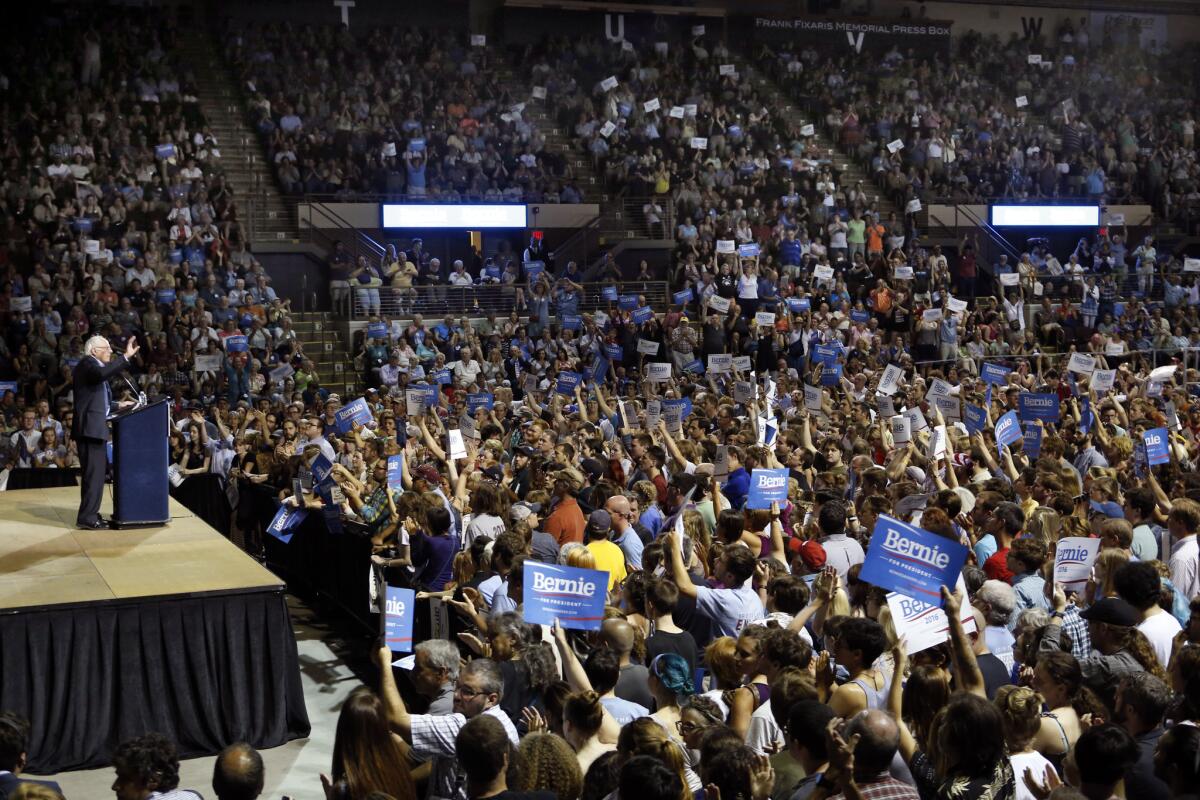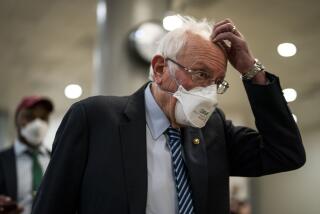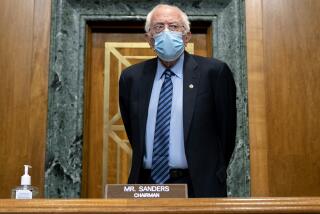Column: How far can Bernie Sanders go?

Democratic presidential candidate Sen. Bernie Sanders of Vermont speaks at a campaign rally in Portland, Maine on July 6.
Bernie Sanders is on a roll. The independent socialist from Vermont, still not a registered Democrat, is drawing big crowds with his gruff populism: 2,500 people in Council Bluffs, Iowa; 7,500 in Portland, Me.; 10,000 in Madison, Wis. He’s raised more than $15 million in mostly small donations — “not from billionaires,” he crows. He’s rising steadily in the polls; one survey shows him only 8 points behind the once untouchable front-runner, Hillary Rodham Clinton, in the early primary state of New Hampshire.
And this week, as if to confer a kind of formal recognition, a Clinton aide conceded that her boss considers Sanders a formidable challenger.
“We’re worried about him, sure,” Clinton aide Jennifer Palmieri said Monday. “He’s a force.... It’s to be expected that Sanders will do well in a Democratic primary.” The Iowa caucuses are still seven months away, but Palmieri was already working to lower expectations — just in case.
So it’s understandable if a touch of giddiness has infected the usually implacable Sanders and his campaign advisors. “I don’t think any of us expected to see thousands of people show up like this,” Sanders’ chief strategist, Tad Devine, told me Tuesday.
Devine, a former aide to Democratic presidential candidates including Walter F. Mondale and John F. Kerry, said there’s no magic in what Sanders has been doing.
“The voters are already there. They want this debate. They were looking for someone to talk about the unfairness they see in the economy,” he said. “Bernie has a very powerful message, and he delivers it in a very unvarnished way,” he said.
How unvarnished?
“The American people understand that establishment politics and establishment economics is not working for the middle class,” Sanders told cheering supporters in Maine on Monday. “Our message to the billionaire class is this: Your greed has got to end, and we are going to end it for you.”
Devine has plotted out a straightforward course for Sanders’ march to the Democratic nomination. It begins with raising roughly $50 million by the end of the year, a target that once seemed impractical but now appears conservative. It includes winning endorsements from other progressive Democrats — ideally including Sen. Elizabeth Warren (D-Mass.), who hasn’t declared a preference. Then it hinges on recruiting thousands of volunteers to help win the caucuses in Iowa and the primary in New Hampshire.
After which, Devine said, “I think it just builds. It feeds on itself…. If you can win a primary or two, the support will come.”
But Devine acknowledges that “the conventional wisdom is still: You’ve got to be kidding.”
And the conventional wisdom is probably right. Despite all those enthusiastic crowds, Sanders remains a long shot.
Consider recent history: Partisan Democrats, like partisan Republicans, are prone to fall in love with a candidate who expresses their views in their purest, most unvarnished form. The best example is another Vermont progressive, Howard Dean, who looked unstoppable in the early stages of the 2004 campaign. In the weeks before the Iowa caucuses, Dean was well ahead in most polls; he ended up losing to Kerry, the establishment choice.
Earlier progressive insurgents included the Rev. Jesse Jackson in 1988 (who won the endorsement of the then-mayor of Burlington, Vt., Bernie Sanders) and Gov. Jerry Brown in 1992 (who finished second in that race to Bill Clinton).
The only recent insurgent to win was Barack Obama in 2008, and he did so by building a coalition that included establishment figures such as Sen. Edward M. Kennedy (D-Mass) plus majority support among African American voters. Sanders has neither of those assets; at this point, Clinton has both.
Besides, a more careful look at the polls demonstrates how far Sanders still has to go. The survey that showed him only 8 points behind in New Hampshire was an outlier; most show Clinton ahead by comfortable margins — just a little less cozy than before.
Still, Sanders is already winning a different contest: the battle to force Clinton into a debate over what Democrats should stand for, especially in economic policy.
Since announcing her candidacy in April, Clinton has campaigned on a platform that could charitably be described as generic: mildly populist rhetoric about the challenges to the middle class, but few specific policies — mostly positions she’s held since 2008, such as a higher minimum wage.
Now Sanders will press Clinton on a long list of his proposals: tax hikes on the wealthy, tougher regulations on Wall Street (including a plan to break up the largest banks), turning Medicare into a government-run health system for all Americans (replacing Obama’s healthcare insurance law), and expanding Social Security benefits (at the price of higher Social Security taxes on the affluent).
Clinton would prefer to duck these issues. (She avoided the question of tax hikes again Tuesday in an interview with CNN.) With Sanders as a relatively serious challenger, she won’t have that option.
A Sanders presidency? Sorry, liberals. It’s not going to happen. But the Vermont socialist will have accomplished some of what he set out to do — and his speech at the Democratic National Convention will be worth staying up for.
Twitter: @doylemcmanus
Follow the Opinion section on Twitter @latimesopinion and Facebook
More to Read
A cure for the common opinion
Get thought-provoking perspectives with our weekly newsletter.
You may occasionally receive promotional content from the Los Angeles Times.







